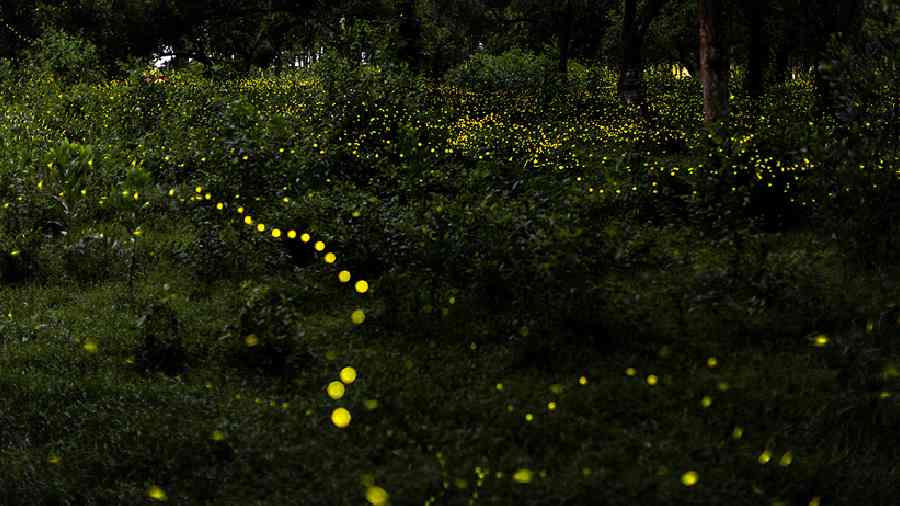Dimmed light
Sir — Fireflies have often been used by writers and film-makers to lend romance to dreary scenes or elevate drama. But these dazzling beetles are now quickly disappearing all around the world because of the destruction of habitats and light pollution. It is, thus, astonishing that in spite of strong opposition from environmentalists, several countries, including India, host firefly festivals or tours. Right before the monsoons, firefly festivals are organised in parts of Maharashtra where tourists gather to observe the illumination by fireflies. But flocking to firefly zones in hordes not only impacts its habitat but also harms its reproductive cycle during the mating season. The survival of fireflies is far more crucial than momentary wonder.
Srijita Moitra, Calcutta
Distorting history
Sir — Kanad Sinha has rightly expressed his concern about the communalisation of history and called for resistance against such endeavours (“Twisted plot”, July 3). The film, Samrat Prithviraj, which is loosely-based on “Prithviraj Raso”, a bardic account of Prithviraja III by Chand Bardai, is filled with historical inaccuracies. As the article points out, the film-makers conveniently ignored other literary and archaeological sources on the Chahamana ruler to propagate the “glory of Hindutva and the treachery and the bigotry of Muslims”. In recent years, many historical movies and television shows have taken the liberty of distorting facts to fit the Hindutva agenda. Ordinary people usually do not verify these claims and presume that these representations are accurate. As a result, people develop false notions about Indian history. People should not blindly believe what they see on screen.
Yousuf Iqbal, Calcutta
Sir — The film, Samrat Prithviraj, starring Akshay Kumar, should be seen as a part of the project to glorify Hindu kings and propagate Hindutva while demonising Muslims. It is an indisputable fact that northern India was invaded numerous times in history and often with the help of indigenous rulers. Muhammad Ghuri marched towards the kingdom of Chahamana with the help of Vijayaraja of Jammu. There is no doubt that Samrat Prithviraj is a propaganda film. Rather than quarrel over the legitimacy of Hindu rulers and how they were apparently dethroned by outsiders, we should remember the reign of rulers like Maharaja Ranjit Singh. The Sikh empire, covering an area of 5.2 lakh square kilometres, had a population of 1.2 crore and was home to 84 lakh Muslims, 29 lakh Hindus and 7.25 lakh Sikhs. All communities peacefully coexisted under the benevolent but strict rule of Maharaja Ranjit Singh. We must celebrate and cherish such instances of harmony in South Asian history.
Haridasan Rajan, Kozhikode, Kerala
Sir — The communalisation of history must be resisted. The sangh parivar is twisting the medieval history of the Indian subcontinent to fit its political agenda. It is worrying that the Union home minister, Amit Shah, has also remarked that historians have given prominence to Mughal history at the cost of Hindu empires, such as the Cholas or Pandyas. It is amply clear that the Bharatiya Janata Party-led Union government wants future generations to have a partial view of history.
Md. Ali Zafar, Asansol
Sir — The erroneous interpretation of history has led to communal polarisation in India. It is a shame that several Bollywood movies are guilty of twisting historical facts. If we divide historical eras strictly along religious lines and consider one community as the oppressor and another as the oppressed, then we overlook the immense cultural synthesis that occurred during these periods and how it shaped Indian society. Cinema and others forms of art should act as a medium of unification instead of providing a distorted version of history.
Srija Maji, Calcutta
Precious legacy
Sir — The reminiscence of Sukanta Chaudhuri about Professor Arun Kumar Das Gupta in his article, “Knowledge seekers” (July 4), reminded me of a different legacy of the English department of Presidency College in the late Seventies. The intellectual tradition of the college was enriched by teachers like ‘AKDG’ and Taraknath Sen who could instil a sense of awe about the subject they taught even among backbenchers with their style of teaching. These erudite scholar-teachers, however, are no longer there and excessive interference of the state government in educational institutions has chipped at its independence. The state government should recognise the contributions of the professors of yesteryear. They have shaped countless young minds passing through the esteemed halls of the institute.
Arun Kumar Baksi, Calcutta
Symbol of pride
Sir — The article, “Big Ben’s bongs to ring out again in London” (July 5), brought to mind the lessons in general knowledge that I received in my childhood. The Big Ben — it was hidden behind a fortress of scaffolding for five years and its hourly bong was muted — was the largest and most accurate four-faced striking and chiming clock in the world at the time of its construction. However, I was not aware that the clock tower has been known as the Elizabeth Tower since 2012 in commemoration of the Queen’s diamond jubilee. The Big Ben is a symbol of British pride and achievements.
Amit Brahmo, Calcutta
Parting shot
Sir — July 6 is celebrated as World Zoonoses Day to spread awareness about the risks posed by zoonotic infections. Zoonoses are infectious diseases occurring in humans caused by a pathogen that has jumped from an animal — rabies, ebola, plague, are some examples. We must remain cautious.
Divyanshu Garg, Ujjain











